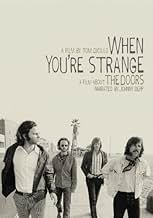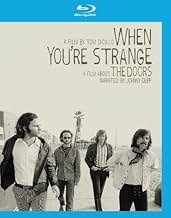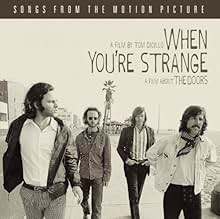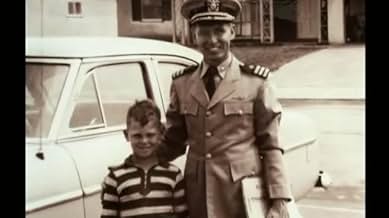NOTE IMDb
7,6/10
10 k
MA NOTE
Ajouter une intrigue dans votre langueA look at the late '60s and early '70s rock band The Doors, including rare exclusive footage.A look at the late '60s and early '70s rock band The Doors, including rare exclusive footage.A look at the late '60s and early '70s rock band The Doors, including rare exclusive footage.
- Réalisation
- Scénario
- Casting principal
- Récompenses
- 2 victoires et 1 nomination au total
Johnny Depp
- Narrator
- (voix)
John Densmore
- Self
- (images d'archives)
Robby Krieger
- Self
- (images d'archives)
Ray Manzarek
- Self
- (images d'archives)
Jim Morrison
- Self
- (images d'archives)
Pamela Courson
- Self
- (images d'archives)
- (as Pam Courson)
The Doors
- Themselves
- (images d'archives)
Murray Goodman
- Self - Judge
- (images d'archives)
Jimi Hendrix
- Self
- (images d'archives)
Lyndon B. Johnson
- Self
- (images d'archives)
- (as Lyndon Johnson)
George S. Morrison
- Self - Jim's Father
- (as Admiral George S. Morrison)
Paul A. Rothchild
- Self
- (images d'archives)
Adolf Hitler
- Self
- (images d'archives)
- (non crédité)
Janis Joplin
- Self
- (images d'archives)
- (non crédité)
John F. Kennedy
- Self
- (images d'archives)
- (non crédité)
Robert F. Kennedy
- Self
- (images d'archives)
- (non crédité)
Avis à la une
Having been a fan for over 20 years, I'm fairly jaded when it comes to bios on the Doors. The new footage and DiCillo's narrative structure offer a truly fresh look at the subject matter, since it's the first time I've really felt I've had an insider's view on the band. Morrison is treated like a real human being, stripped of all the legend and bombast. Instead of the pretentious rock star, you get to see Jim the person evolving over time, with all the joy and suffering that he experienced. There's a shot of him exiting the courtroom in Miami with a look of vulnerability that I found shocking, as it's at odds with image of the cool, cocky singer. The history of the band is subtly told though a wash of images and sparse narration which touch all the milestones without feeling like another retread. It definitely deserves another viewing, consider me a confirmed buyer of the DVD.
10rtcblc
I was able to see this at Sundance this morning. What an outstanding film!! By weaving original footage from many sources including takes from a movie Jim Morrison made himself Mr. DiCillo presents an intimate view of all the DOORS in the context of the 60's and early 70's. An intimate look at the complex relationships between Morrison and the other members and hugely entertaining. DiCillo spoke at the end of the movie and during the Q&A's he mentioned one critic accused him of "recreating" footage in the film. The supposed recreated footage was actually Morrisons own film starring himself. This rumor is extremely frustrating to DiCillo as it is spreading via the internet. See for yourself, this is a excellent movie. I asked DiCillo if he had cooperation from Morrison's family. He said he had a lot of help from Morrisons family especially on the relationship between Jim and his father. I hope someone picks it up for distribution. I'd go again.
I'm a big fan of The Doors and pretty much knew the story before watching this film. And yet I found Johnny Depp to be a very convincing narrator (usually I find narrators to be quite annoying in documentaries!), and the film was quite fluid and easy to watch. Some really cool footage as well! For anyone who's interested, Oliver Stone's 1992 film The Doors is a good and fairly accurate non-documentary worth watching, if you haven't seen it already.
Well, being a huge fan, knowing quite a lot of people in the Doors (full) circle and having been everywhere from Pere Lachaise to Rothdell Trail to Fairhaven Memorial... I have to say I did turn this on with a slight sense of anxiousness as to whether it would be another destruction of James Douglas Morrison's entire character as both the Oliver Stone horrorshow and the numerous vacuous "rockumentataries" have done.
However, I have to say, I was pleasantly surprised in the main. If you're a hardcore Doors fan then despite the claims of previously unseen footage, you will have seen most of this, few people have been to Paris without bumping into the likes of Rainer Moddeman and other well connected superfans and blagging bootleg stuff and HWY and Feast of Friends have been pretty easy to secure for a long time now as have tapes of Critique etc. But, I was quite impressed with what Tom Dicillo did with the footage, not only was he sympathetic and judicious with it but he accented the narrative with it almost as good as Densmore accented anything Jim did. Clearly, for the eagle eyed, he used footage from other events to underscore a point on an entirely different event but that's just me being picky - ultimately, there is a finite amount of footage that could be trawled. He avoided a lot of the glaring pitfalls one could easily make in such a documentary - for example he didn't get too caught in the trap of juxtaposing events in the 60's with the events of the Doors (there was some of this but it was measured and relevant) and I thought Depp was okay with his voice-over although he was a little dour and the script was at times a little prescriptive and compartmentalised. I do however appreciate that the film has to be appeal to more than the hardcore afficianados and that a balance has to be struck so I think the film really does work well both for those who only have a loose interest in The Doors (or even those just interested in the era) and those more fanatical about The Doors.
I know that Ray (at least) backed this film vocally which gives it credibility from the get go and I you have to give the guy credit for using only original footage. That said, this probably reduces the "filmmaking" to that of an editor so I don't want to be too gushing but still, give the guy his due, the end product is enjoyable, reasonably balanced, it maintained interest and it definitely had some nice touches in it which as I said derived from clever use of the stock material. It wasn't just the choice of footage; it was the more the way it was deployed and paced.
Maybe if budget (or sensibilities) had allowed, the film could have encompassed some other original footage (or other stock footage even) for those Doors fans who want to learn more about the Doors landmarks - be it shots of Venice beach or Rue Beautreillis but what I am glad of is the fact that they stayed well away from including interviews with the usual crowd like Grace Slick etc. which I think would have corrupted the output.
I'll watch it (and review it) sober again and see whether I feel the same but all in all, to quote the Velvet Menace himself, "pretty good, pretty good, pretty neat, pretty neat".
However, I have to say, I was pleasantly surprised in the main. If you're a hardcore Doors fan then despite the claims of previously unseen footage, you will have seen most of this, few people have been to Paris without bumping into the likes of Rainer Moddeman and other well connected superfans and blagging bootleg stuff and HWY and Feast of Friends have been pretty easy to secure for a long time now as have tapes of Critique etc. But, I was quite impressed with what Tom Dicillo did with the footage, not only was he sympathetic and judicious with it but he accented the narrative with it almost as good as Densmore accented anything Jim did. Clearly, for the eagle eyed, he used footage from other events to underscore a point on an entirely different event but that's just me being picky - ultimately, there is a finite amount of footage that could be trawled. He avoided a lot of the glaring pitfalls one could easily make in such a documentary - for example he didn't get too caught in the trap of juxtaposing events in the 60's with the events of the Doors (there was some of this but it was measured and relevant) and I thought Depp was okay with his voice-over although he was a little dour and the script was at times a little prescriptive and compartmentalised. I do however appreciate that the film has to be appeal to more than the hardcore afficianados and that a balance has to be struck so I think the film really does work well both for those who only have a loose interest in The Doors (or even those just interested in the era) and those more fanatical about The Doors.
I know that Ray (at least) backed this film vocally which gives it credibility from the get go and I you have to give the guy credit for using only original footage. That said, this probably reduces the "filmmaking" to that of an editor so I don't want to be too gushing but still, give the guy his due, the end product is enjoyable, reasonably balanced, it maintained interest and it definitely had some nice touches in it which as I said derived from clever use of the stock material. It wasn't just the choice of footage; it was the more the way it was deployed and paced.
Maybe if budget (or sensibilities) had allowed, the film could have encompassed some other original footage (or other stock footage even) for those Doors fans who want to learn more about the Doors landmarks - be it shots of Venice beach or Rue Beautreillis but what I am glad of is the fact that they stayed well away from including interviews with the usual crowd like Grace Slick etc. which I think would have corrupted the output.
I'll watch it (and review it) sober again and see whether I feel the same but all in all, to quote the Velvet Menace himself, "pretty good, pretty good, pretty neat, pretty neat".
When You're Strange is made up of all archival footage, clips taken from some famous scenes (i.e. Ed Sullivan Show appearance, intro's at the airport, infamous concert) and not-so-famous ones (clips from the rarely seen films Highway and Feast of Friends are seen here), and it's done in what could be called objectively adulatory. That might not make sense, but what Tom DiCillo wants to show is what the Doors were like, the times they were in, and what was up with their frontman, Jim Morrison, who was with the band for five years before dying one night in a bathtub under mysterious circumstances. At the same time as he's giving us the facts via narration read by Johnny Depp, and with the footage, he wants the audience to see what was so unique about the Doors, their strange appeal as rock figures unlike anyone else at the time; there were other hippie-rock bands, and other poets, and other blues bands, but not quite in this combination.
For the newcomers, the documentary basically tells you everything you need to know, or would care to know, about Jim Morrison and the Doors. I mention his name first because, as a liability with the documentary for fans, it doesn't really go that much into the other members' lives at the time. Perhaps DiCillo saw that not a lot of interest was really there with Ray Manzarek, Robby Krieger and John Densmore (comparatively to Jim, the documentary might tell us, they were very much normal, save for trading off from acid to meditation), or that Morrison is such a dynamic figure- an icon to some, just another wasted rocker to others- that he'd have to take up the screen time. A similar issue could be taken with Oliver Stone's bio-pic - on the other hand, as the film makes pretty clear, after Morrison died, the Doors were practically bust (the doc fails to mention that the band actually *did* go on to make a couple of albums in the 70's, both huge flops, and cynically tour a few years ago as "The 21st Century Doors", but I digress).
An issue can be taken with nothing too new being given to us historically about the band, and (more-so) that DiCillo frames it into the history we've seen so often: tumultuous times, upheaval of society, Johnson and Nixon's Vietnam and domestic policies, Kennedy and MLK assassinations and Charles Manson and Kent etc etc. But what works best is when we can focus on the band as a whole, what made them different, how they somehow gelled together as equal parts blues, poetry, psychedelia, jazz, rock, whatever, in how they approached the songs (no bass player for one thing) and how they recorded tracks. One of the more fascinating aspects is hearing how long the creative process took; their best albums took mere days to record (self-titled debut and LA Woman) while a mixed-bag of pop-tunes like The Soft Parade took nearly a year.
And in the middle, like a vortex of leather and hair and strikingly handsome (or as some might say "Hawt") lead figure, Jim Morrison takes up a lot of the airtime. He's an intriguing, baffling figure, how a man with such talent and natural charisma, as a singer and a writer, felt insecure about himself and also became "Jimbo" as Manzarek called him, a wild alter-ego on stage that made a split between those who wanted the Doors, and those that wanted to spectacle of "JIM". He doesn't come off too well as a person ultimately, as a philanderer and alcoholic and sometimes just cruel person... but at the end of it all, his creative output with the Doors in a few years amounted to more than some rock bands can get in decades of work. Again, this is nothing too new to realize, and some of the big facts are so well covered as to be like pop-legend. But DiCillo does a thorough job putting it altogether, and, substantively (if not as a visionary experience) it trumps Stone's film.
For the newcomers, the documentary basically tells you everything you need to know, or would care to know, about Jim Morrison and the Doors. I mention his name first because, as a liability with the documentary for fans, it doesn't really go that much into the other members' lives at the time. Perhaps DiCillo saw that not a lot of interest was really there with Ray Manzarek, Robby Krieger and John Densmore (comparatively to Jim, the documentary might tell us, they were very much normal, save for trading off from acid to meditation), or that Morrison is such a dynamic figure- an icon to some, just another wasted rocker to others- that he'd have to take up the screen time. A similar issue could be taken with Oliver Stone's bio-pic - on the other hand, as the film makes pretty clear, after Morrison died, the Doors were practically bust (the doc fails to mention that the band actually *did* go on to make a couple of albums in the 70's, both huge flops, and cynically tour a few years ago as "The 21st Century Doors", but I digress).
An issue can be taken with nothing too new being given to us historically about the band, and (more-so) that DiCillo frames it into the history we've seen so often: tumultuous times, upheaval of society, Johnson and Nixon's Vietnam and domestic policies, Kennedy and MLK assassinations and Charles Manson and Kent etc etc. But what works best is when we can focus on the band as a whole, what made them different, how they somehow gelled together as equal parts blues, poetry, psychedelia, jazz, rock, whatever, in how they approached the songs (no bass player for one thing) and how they recorded tracks. One of the more fascinating aspects is hearing how long the creative process took; their best albums took mere days to record (self-titled debut and LA Woman) while a mixed-bag of pop-tunes like The Soft Parade took nearly a year.
And in the middle, like a vortex of leather and hair and strikingly handsome (or as some might say "Hawt") lead figure, Jim Morrison takes up a lot of the airtime. He's an intriguing, baffling figure, how a man with such talent and natural charisma, as a singer and a writer, felt insecure about himself and also became "Jimbo" as Manzarek called him, a wild alter-ego on stage that made a split between those who wanted the Doors, and those that wanted to spectacle of "JIM". He doesn't come off too well as a person ultimately, as a philanderer and alcoholic and sometimes just cruel person... but at the end of it all, his creative output with the Doors in a few years amounted to more than some rock bands can get in decades of work. Again, this is nothing too new to realize, and some of the big facts are so well covered as to be like pop-legend. But DiCillo does a thorough job putting it altogether, and, substantively (if not as a visionary experience) it trumps Stone's film.
Le saviez-vous
- AnecdotesFor the first time in the band's history unprecedented access was granted, regarding the previously unseen footage of Jim Morrison.
- GaffesA mock newspaper clipping announces both that Sharon Tate and her friends have been found murdered and that Charles Manson and his "Family" are suspected. Manson and the "Family" were not identified as the Tate killers until December 1969, more than four months after the murders happened.
- Citations
Jim Morrison: The music can't help but reflecting things that are happening around you
- ConnexionsEdited from Feast of Friends (1969)
Meilleurs choix
Connectez-vous pour évaluer et suivre la liste de favoris afin de recevoir des recommandations personnalisées
- How long is When You're Strange?Alimenté par Alexa
Détails
- Date de sortie
- Pays d’origine
- Site officiel
- Langue
- Aussi connu sous le nom de
- The Doors. When you're strange
- Voir plus de crédits d'entreprise sur IMDbPro
Box-office
- Montant brut aux États-Unis et au Canada
- 246 078 $US
- Week-end de sortie aux États-Unis et au Canada
- 66 833 $US
- 11 avr. 2010
- Montant brut mondial
- 1 194 182 $US
- Durée
- 1h 26min(86 min)
- Couleur
- Mixage
- Rapport de forme
- 1.85 : 1
Contribuer à cette page
Suggérer une modification ou ajouter du contenu manquant

































